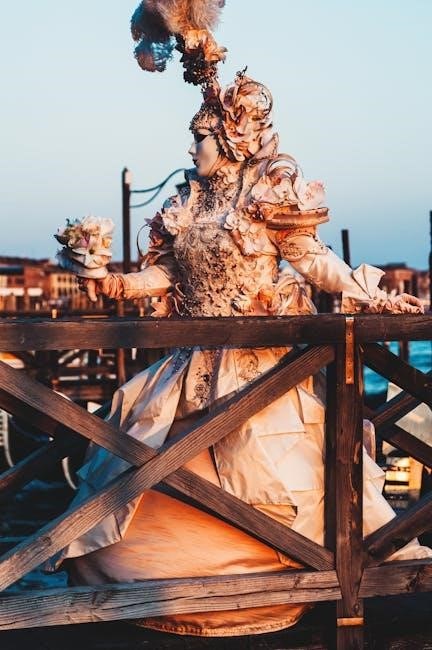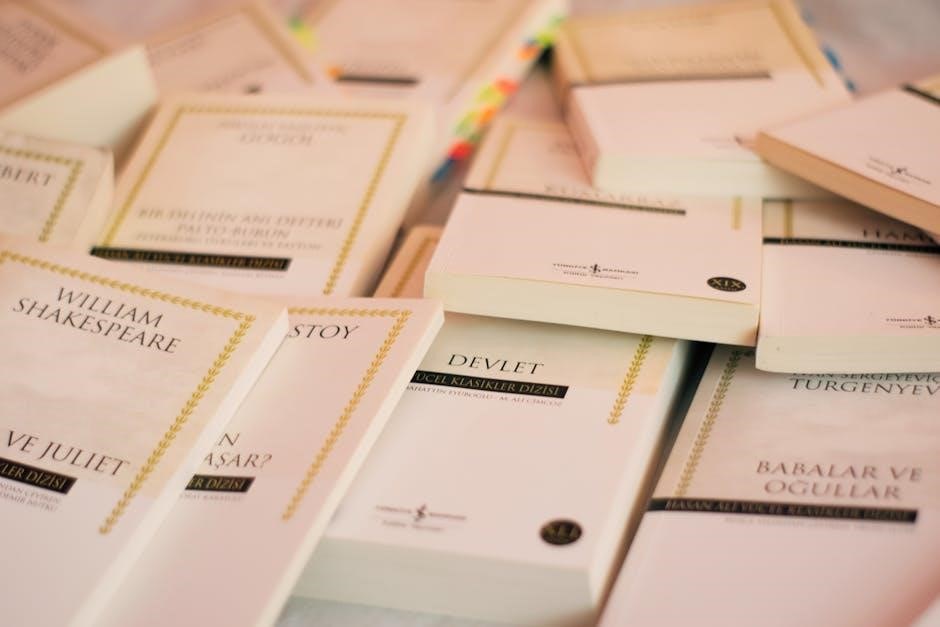Act 2 Study Guide: Romeo and Juliet
Dive into Act 2 of Shakespeare’s Romeo and Juliet, where young love blossoms amidst a bitter feud. This guide will explore the key scenes, unravel the complex themes, and analyze the literary devices that shape this pivotal act, enhancing your understanding of the play’s tragic trajectory.
Act 2 Overview
Act 2 of Romeo and Juliet marks a significant shift in the play’s trajectory, moving from initial infatuation to a whirlwind romance. This act primarily focuses on the burgeoning love between Romeo and Juliet, culminating in their secret marriage. The ancient feud between the Montagues and Capulets serves as a constant backdrop, adding tension and foreshadowing the tragic consequences to come.
The act opens with Romeo’s friends, Benvolio and Mercutio, searching for him after the Capulet feast. Romeo, however, is drawn back to the Capulet orchard, leading to the iconic balcony scene where he and Juliet declare their love for one another. This scene is rich with light and dark imagery, reflecting the duality of their love amidst the surrounding conflict.
Act 2 also introduces Friar Lawrence, a pivotal character who agrees to marry Romeo and Juliet, hoping to end the family feud. We also see the nurse, who is important to the plot, as well as we also see Romeo’s transition from Rosaline to Juliet.
The swiftness of their relationship, contrasted with the deep-seated hatred of their families, creates dramatic irony and foreshadows the tragic events that will unfold. Act 2 sets the stage for the play’s central conflict, emphasizing themes of love, loyalty, and the destructive power of hatred.
Act 2, Scene 1: Summary and Analysis

Act 2, Scene 1 of Romeo and Juliet finds Romeo separated from Benvolio and Mercutio after the Capulet feast. Romeo, still captivated by Juliet, evades his friends’ attempts to find him, driven by an intense desire to be near her. Benvolio and Mercutio, unaware of Romeo’s newfound love, search for him, mocking his infatuation with Rosaline.
Mercutio’s Queen Mab speech dominates this scene, showcasing his wit and cynicism. He uses the fantastical tale of Queen Mab to satirize the nature of dreams and desires, particularly those related to love and ambition. This speech provides insight into Mercutio’s character, highlighting his skepticism and contrasting with Romeo’s idealism.
The scene underscores the immediate and powerful impact Juliet has had on Romeo. His willingness to abandon his friends and risk danger to be near her demonstrates the intensity of his feelings. This is evidence of the strong bond when Romeo risks his life to see Juliet.
Benvolio and Mercutio’s lighthearted banter also serves to emphasize Romeo’s changed demeanor. Their inability to comprehend his sudden shift in affections highlights the transformative power of love and sets the stage for the more significant events to come. It reinforces themes that have already appeared.
Act 2, Scene 2: The Balcony Scene
Act 2, Scene 2, famously known as the balcony scene, is the heart of Romeo and Juliet’s burgeoning love. Romeo, hidden in the Capulet orchard, overhears Juliet expressing her love for him, unaware of his presence. He reveals himself, and they exchange vows of love, defying the feud that separates their families.
Juliet’s soliloquy, beginning with “O Romeo, Romeo! Wherefore art thou Romeo?” explores the arbitrary nature of names and the idea that Romeo’s identity as a Montague is a superficial barrier to their love. She questions why his name should matter, suggesting that love transcends family rivalries.
The scene is rich with poetic language and imagery. Romeo compares Juliet’s beauty to the sun, eclipsing the moon, which is a reference to Diana, the Roman goddess of the moon. Light and dark imagery is used extensively, with Juliet’s eyes compared to stars.

The scene highlights the impetuous nature of their love and their willingness to defy societal expectations. Despite the dangers and obstacles, they commit to each other, solidifying their bond. Though the word balcony is never technically mentioned, this is the iconic scene referenced in art and popular culture.
Light and Dark Imagery in Act 2, Scene 2
In Act 2, Scene 2, Shakespeare masterfully employs light and dark imagery to underscore the themes of love, beauty, and the conflict between the lovers and the world around them. The pervasive use of these contrasting images creates a powerful and evocative atmosphere, enhancing the emotional impact of the scene. Romeo frequently associates Juliet with light, portraying her as a radiant beacon of beauty and hope.
He compares her to the sun, stating that she surpasses the moon in brightness, thereby diminishing the goddess Diana’s (the moon) beauty. This comparison not only emphasizes Juliet’s physical allure but also suggests that she is a source of warmth and life in Romeo’s world. Her eyes are likened to stars, further reinforcing her association with celestial brilliance and purity.
Conversely, darkness often represents the dangers and obstacles that Romeo and Juliet face. The night provides cover for their clandestine meeting, but it also symbolizes the secrecy and peril inherent in their forbidden love. The darkness underscores the fact that their love exists outside the bounds of societal approval, hidden from the watchful eyes of their feuding families. The interplay of light and darkness heightens the tension and foreshadows the tragic consequences of their actions.
Act 2, Scene 3: Romeo and Friar Lawrence
Act 2, Scene 3 introduces Friar Lawrence, a pivotal character who acts as Romeo’s confidant and advisor. This scene is crucial for understanding the Friar’s role in the unfolding tragedy and exploring themes of love, impulsivity, and the potential for reconciliation.

Romeo seeks out Friar Lawrence early in the morning, revealing his newfound love for Juliet and his desire to marry her. He assures the Friar that his feelings for Rosaline are gone, replaced by a genuine and profound affection for Juliet; This sudden shift highlights Romeo’s impulsive nature and his tendency to fall deeply in love quickly.
Friar Lawrence is initially surprised by Romeo’s rapid change of heart. He cautions Romeo about the dangers of infatuation and the importance of love that is both true and lasting. However, he ultimately agrees to marry Romeo and Juliet, believing that their union might help to end the feud between the Montagues and Capulets. This decision, though well-intentioned, sets in motion a chain of events that lead to the play’s tragic conclusion. The Friar’s hope for peace underscores the theme of reconciliation, while his willingness to assist the young lovers emphasizes the power of love to transcend hatred.
Act 2, Scene 4: Mercutio and Romeo’s Change
Act 2, Scene 4 provides a stark contrast to the romantic encounters of the previous scenes, showcasing Mercutio’s witty and often cynical perspective on love. This scene highlights the change in Romeo’s demeanor and sets the stage for the events to come.
Mercutio and Benvolio are searching for Romeo, unaware of his secret meeting with Juliet. They discuss Romeo’s recent behavior, noting his melancholy and preoccupation with Rosaline. Mercutio mocks Romeo’s romantic notions and engages in bawdy humor, providing a comedic counterpoint to Romeo’s idealized view of love. His Queen Mab speech further illustrates his fantastical and skeptical outlook.
When Romeo finally appears, he is noticeably different. He is more cheerful and witty, having shed his earlier despair. Mercutio is delighted to see Romeo’s transformation, but he remains unaware of the true cause. This scene underscores the contrast between Mercutio’s lighthearted cynicism and Romeo’s passionate idealism. It also foreshadows the dangers of Mercutio’s quick temper and his inability to take love seriously, traits that will ultimately contribute to his tragic fate. The scene emphasizes Romeo’s shift from infatuation with Rosaline to genuine love for Juliet, marking a significant turning point in his character development.
Act 2, Scene 5: The Nurse’s Role
Act 2, Scene 5 showcases the Nurse’s crucial role as a messenger and confidante to Juliet. This scene reveals her endearing, yet sometimes frustrating, personality and her deep affection for Juliet, highlighting her contribution to the unfolding events.
Juliet anxiously awaits the Nurse’s return with news from Romeo. The Nurse arrives, but she delays delivering the message, teasing Juliet with her complaints of weariness and aches. This delay intensifies Juliet’s anticipation and emphasizes the Nurse’s somewhat exasperating nature. When she finally reveals Romeo’s message, she informs Juliet of Romeo’s plan for them to meet at Friar Lawrence’s cell to be married;
The Nurse’s affection for Juliet is evident in her willingness to act as a go-between, despite the potential risks. However, her rambling and teasing also provide comic relief, contrasting with the intensity of the young lovers’ passion. This scene underscores the Nurse’s complex character: she is both a loving caregiver and a somewhat unreliable messenger. Her role is pivotal, as she facilitates the secret marriage that will have profound consequences for Romeo and Juliet. The Nurse’s actions, driven by her love for Juliet, contribute significantly to the play’s dramatic progression.
Act 2, Scene 6: The Marriage Ceremony

Act 2, Scene 6 depicts the marriage of Romeo and Juliet, a pivotal moment brimming with both hope and ominous foreshadowing. This brief scene, set in Friar Lawrence’s cell, marks the culmination of their whirlwind romance and sets the stage for the tragedy to come.
Romeo and Friar Lawrence await Juliet’s arrival. Romeo, consumed by his love, expresses his unwavering devotion, declaring that no misfortune can outweigh the joy of being with Juliet. Friar Lawrence cautions Romeo, advising him to love moderately, stating, “These violent delights have violent ends.” This warning foreshadows the tragic consequences of their passionate and impulsive love.
Juliet arrives, and the Friar leads them both to be married. The scene is short, and the actual ceremony is not shown, leaving the audience to imagine the vows exchanged. The brevity of the scene, coupled with Friar Lawrence’s ominous words, creates a sense of foreboding. While the marriage represents the lovers’ ultimate union, it is also a secret act of defiance against their feuding families, a decision that will ultimately lead to their demise. The scene emphasizes the themes of love, fate, and the dangers of impulsivity, setting the stage for the play’s tragic climax.
Themes in Act 2: Love and Loyalty
Act 2 of Romeo and Juliet showcases the powerful and conflicting themes of love and loyalty; The act primarily explores the intoxicating nature of romantic love, exemplified by Romeo and Juliet’s immediate and all-consuming passion for one another. Their love transcends the deep-seated hatred between their families, leading them to defy social norms and familial expectations.
The theme of loyalty is tested as Romeo and Juliet grapple with their allegiances. They are torn between their devotion to their families, the Montagues and Capulets, and their newfound love for each other. Their decision to marry in secret highlights their loyalty to their love, choosing each other over their familial obligations. This defiance underscores the play’s exploration of individual desires versus societal pressures.
Furthermore, the loyalty of other characters is also examined. Friar Lawrence, in agreeing to marry Romeo and Juliet, demonstrates his loyalty to Romeo and his hope for ending the feud. However, his actions also raise questions about the potential consequences of misplaced loyalty. Act 2 lays the groundwork for the tragic events to come by highlighting the complexities and potential conflicts arising from the competing demands of love and loyalty.
Foreshadowing and Dramatic Irony in Act 2
Act 2 of Romeo and Juliet is rich with foreshadowing and dramatic irony, enhancing the sense of impending tragedy. Foreshadowing, the hinting at future events, is evident in Friar Lawrence’s soliloquy about herbs, where he speaks of both their healing and poisonous properties, mirroring the duality of love and hate in the play and foreshadowing the tragic outcome linked to potions.
Furthermore, Romeo’s impulsive nature and willingness to risk everything for Juliet foreshadow the reckless decisions that will ultimately lead to their downfall. The Chorus’s prologue to Act 2 also hints at the “difficulties ahead” for the young lovers, foreshadowing the obstacles they will face due to their families’ feud.
Dramatic irony, where the audience knows more than the characters, is prevalent throughout the act. For example, the audience is aware of Romeo and Juliet’s secret marriage, while their families remain oblivious, creating tension and anticipation. This knowledge heightens the tragic impact of their actions, as the audience understands the potential consequences of their secret union. The use of these literary devices in Act 2 serves to amplify the sense of doom and inevitability that permeates the play.
